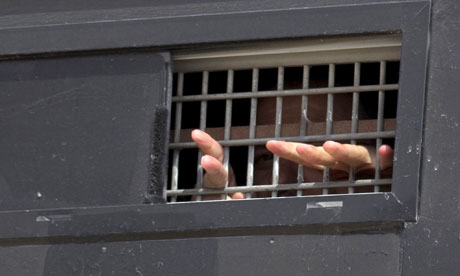The Dar Al-Ifta and the Arab League condemned on Monday the alleged violations committed by the Israeli authorities against Palestinian prisoners, calling upon human rights organisations and the international community to intervene.
A statement by the Dar Al-Ifta described the violations in Israeli administrative detention against Palestinians as a “war crime”. The religious institution stated that penalties must be imposed on Israel for its violations, such as banning prisoners from the simplest facilities according to the 4th Geneva conventions signed in 1949.
On the other hand, the Arab League called upon the United Nations and the UN Security Council to pressure Israel and save the Palestinian detainees in Israeli prisons.
Palestinian president Mahmoud Abbas asserted the continuation of support to the detained Palestinians in Israeli prisoners, while calling upon the international committee to intervene and rescue the prisoners.
Similarly, Palestinian foreign minister Riyad al-Maliki said, in an official statement, that the ministry called all of its diplomats to exert all their efforts to advocate Palestinian detainees’ rights all over the world and to call for international human rights organisations’ intervention.
On Monday, around 1,300 Palestinian prisoners went on a hunger strike to have their demand approved, according to Palestinian officials.
Taha El-Khateeb, a Palestinian political analyst, told Daily News Egypt that on top of the list of prisoners’ demands were the availability of a telephone in order to call relatives, restoring previous systems of visits to allow relatives to visit twice a month, increasing the period of the visit from 45 minutes to an hour and a half, and terminating previous decisions which obligates detainees to pay for their medical expenses.
El-Khateeb said that, previously, the Israeli Prison Service was responsible for covering treatment expenses, but this was stopped last year, causing outrage among the prisoners.
“Before we talk about Arab solidarity, we need a Palestinian-Palestinian cooperation that includes all political factions to advocate detainees’ rights in the occupation prisons in the first place. Israel refused to pay medical expenses to the Palestinian detainees. How can any detainee afford that?”
The political analyst highlighted the story of Karim Younes, one of the 1,300 Palestinians prisoners who joined the hunger strike, saying that he was detained by the Israeli occupation forces in 1985. According El-Khateeb’s estimations, there are 6,000 prisoners in Israeli detention centres.
“Younes should be treated as a ‘prisoner of war’. He was an Arab citizen of Israel, and he got detained without accusations,” El-Khateeb added.
He explained, “Palestine needs an urgent meeting for Arab foreign ministers to issue an international decision to the Security Council in order to stop the prisoners’ suffering, not only release condemning statements.”
The primary reaction by the Israeli prison administration so far, according to several local Palestinian outlets, was the threat of moving the prisoners to El-Nakb Prison.
The prison is located in El-Nakb desert near the Egyptian borders and has a number of Palestinian prisoners who got detained after their participation in the second Intifada.
Tarek Al-Moamer, a Palestinian political researcher said that “occupation authorities threatened prisoners to move them to El-Nakb Prison to break their collaboration and divide them.”
He added that Israeli officials know well that hunger strikes can be an effective tool to achieve demands, citing previous acts of striking throughout the years.


